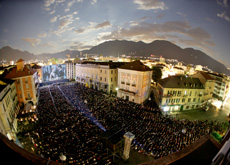Local cinema celebrates boom year

Swiss films have enjoyed a golden year, with 37 awards at international festivals and reaching a domestic market share of ten per cent for the first time.
But political squabbles threaten to stymie the industry’s impetus and make the New Year not quite as prosperous as Swiss moviemakers would like it to be.
Fifty-five Swiss films (18 features, 15 documentaries and 22 shorts) were selected at the major international festivals and 37 picked up awards. In 2005 only ten of 45 films won awards.
The performance abroad was echoed in record audiences for Swiss films at local theatres: out of 14,000,000 total admissions (as of December 1), more than 1,400,000 were for Swiss films.
This compares with a 5.96 per cent market share in 2005 and 2.59 per cent in 2004.
Grounding, Michael Steiner’s populist dramatisation of the collapse of national carrier Swissair, was the most successful Swiss film of the year – one of four films to break the 200,000 mark.
It was a good year for Steiner: his previous film, Mein Namen ist Eugen (My name is Eugen), won the 2006 Swiss Film Prize and was the most successful Swiss film since Die Schweizermacher (The Swiss Makers) in 1978.
“Quantum leap”
“I wasn’t surprised that there was a success but I was surprised by the extent of it,” Micha Schiwow, head of the national film promotion organisation Swiss Films, told swissinfo.
Explaining the “quantum leap”, as he put it, Schiwow believed a positive perception of Swiss films had been built up over the previous years.
“There was certainly an element of chance that so many films came out in one year, but the fact that the audience reacted so positively to Swiss films and that this interest also grew so much internationally is not down to luck,” he said.
Peter-Christian Fueter, producer of Grounding, told swissinfo: “There’s a new generation [of directors] with a different approach to cinema – they are not afraid to entertain people and hopefully they do it in an intelligent way, because the public is not stupid.”
And the award goes to…
Although Swiss films still struggle to break through to international audiences, they made it to eight of the 12 “Category A” film festivals.
Switzerland was well-represented at Cannes in the Cinemas of the World section, three features were screened at the Piazza Grande at Locarno and Sundance hosted three documentaries, including Christian Frei’s The Giant Buddhas.
Nachbeben (Aftershock) by Stina Werenfels, Vitus by Fredi M. Murer and Thomas Imbach’s Lenz all had their international premieres at the Berlin Film Festival.
Vitus – the Swiss contender for the Oscars in February – also won the Audience Award at Rome, Chicago and Los Angeles and the Bronze Bear for Best Director at Berlin. The schmaltzy drama about a child piano prodigy has already been sold to more than 30 countries, including the United States.
Das Fräulein (Fraulein), a relationship drama by Swiss director Andrea Štaka, won the Golden Leopard at Locarno – the first Swiss film to do so for 21 years – and picked up two prizes at Sarajevo.
Challenges
Despite all the good news, not everyone is happy. Earlier in December Cinésuisse, the umbrella organisation for the Swiss film industry, said the government’s “Succès Cinéma” scheme, which is meant to reward successful Swiss filmmakers, was in fact “punishing” them.
Under the SFr4.5 million ($3.8 million) scheme, films that sell more than 10,000 tickets receive one SFr10.30 “success voucher” per ticket (up to a maximum of 100,000 tickets).
What’s needling Swiss filmmakers however is that in a bumper year such as 2006 there’s simply not enough in the government pot to go around, resulting in lower payouts. This in turn threatens filmmakers’ chances of recovering costs.
Cinésuisse called for parliament to increase the Succès Cinéma budget for 2006 to SFr7.5 million, but this demand was later rejected.
One thing is certain: January 24 will see the most interesting Swiss Film Prize for a while, with Vitus, Grounding and Das Fräulein all fighting it out for the SFr60,000 award. Vitus might sneak it.
swissinfo, Thomas Stephens
The most successful film ever in Switzerland, which has a population of 7.4 million and 323 cinemas, is Titanic (1997), which sold just under two million tickets – almost double the runners-up, Finding Nemo (2003) and Ice Age 2 (2006).
The most successful Swiss film ever is the 1978 comedy Die Schweizermacher – in fifth place overall – which sold just under a million tickets. This is followed by Mein Namen ist Eugen (2005) and Achtung, Fertig, Charlie! (2003), which both sold just under 600,000 tickets.
Most successful Swiss films in 2006 (* still in theatres. Source: Pro Cinema):
Grounding (373,800 admissions)
Die Herbstzeitlosen* (300,105)
Handyman (204,373)
Vitus* (193,471)
Jeune Homme (98,665)
–
Most successful films overall in 2006:
Ice Age 2 (1,060,458)
Pirates of the Caribbean 2 (687,845)
The Da Vinci Code (614,855)
Grounding (373,800)
Perfume* (367,995)
The total government budget for cinema in 2006 is SFr41.5 million.
The proportion set aside to cover all stages of the production and promotion of a film totalled SFr23,350,000 for 2006.
Swiss Films, the national film promotion organisation, contributes more than SFr230,000 towards networking and general support and SFr150,000 to creating international copies, for example subtitled versions, to present at film festivals.

In compliance with the JTI standards
More: SWI swissinfo.ch certified by the Journalism Trust Initiative













You can find an overview of ongoing debates with our journalists here . Please join us!
If you want to start a conversation about a topic raised in this article or want to report factual errors, email us at english@swissinfo.ch.